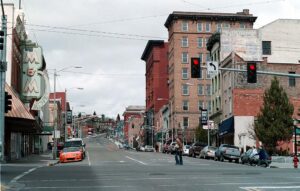There are a lot of questions to ask yourself before relocating to a new city. Some are more obvious than others: maybe access to the outdoors is a priority to you, or maybe your first thought is the quality of the local school systems.
Especially if you’re thinking of moving to a larger city (or perhaps already living in one), transportation should be pretty high on your list of considerations. The average commute time nationwide in 2018 was 26.6 minutes one-way — that’s an average of about 230 hours spent getting to work every year. Depending on the public transit options, long commutes can also mean large costs: exorbitant vehicle registration fees, fluctuating gas prices and general car maintenance costs seem to add up pretty quickly. Plus, if you’re spending an hour each day outside the carpool lane, that’s an hour you could be spending doing something more productive.

What the Average Commute in Seattle Looks Like
Washington as a state has the ninth worst commute time in the country — the average commuter can expect to spend at least a half hour getting to work, no matter how they choose to do it. But, as expected, the average commute varies greatly from city to city, especially considering the quality of public transportation in Seattle versus in more rural spots in the state.
Public Transit
A single adult fare — transfers included — costs $2.75 in the Puget Sound region, which is quite a bit if you’re forking over fare twice a day. There are discounted monthly passes available, but the prices vary depending on the usual price of fare, i.e. the distance of the commute. For argument’s sake, we’ll take a monthly pass at the $99 price point.
For both bus and car commuters, the most aggravating part of living in Seattle is probably the traffic. “I didn’t think to Google Seattle traffic,“ said Colleen Williams, one New-Yorker-turned-Seattleite whose commute is about 90 minutes each way. “I had no idea it was this insane. The trip home is even worse. And oh god, if there’s a game — any game at all, I’ve been on the bus two-and-a-half hours.”
Thanks to outlandish inner-city housing prices, Seattle has experienced a huge increase in “mega-commuters” like Williams — those who found suitable housing in suburban areas, but must travel at least 90 minutes to and from work.
Commuting by Car
Additional considerations for those who choose to drive to work? The cost to register a car in Washington is only an estimated $83, but gas prices in Washington are consistently one of the highest in the country: in November 2018, Washington experienced an average price of $3.35/gallon. The national average at the time was $2.53.
We’ll assume general maintenance costs will be relatively similar across states.

What the Average Commute in Butte Looks Like
Montana’s average commute time, on the other hand, is well under the national average: just a short 17.1 minutes. Given population density (or lack thereof), it makes sense — but no matter how many people live in your neighborhood, the value of an extra 20 to 120 minutes every day remains consistent and considerable.
Public Transit
Many cities of its size have limited public transit options, but Butte boasts bus routes that service the outermost areas of town. And the best part? They’re fare-free. Go ahead and subtract a transit pass and a hundred bucks from your monthly budget.
Commuting by Car
Most people, however, will take their car to work — especially those setting up shop in the Montana Connections Business Development Park (MCBDP), which sits slightly outside city limits. The cost to register a car in Montana is right around the cost in Washington (about $87 for vehicles 5 years or older), but the biggest difference lies in gas prices. Right now (in January 2019), gas prices in Montana are on average $2.31/gallon, which is about $0.70 less on the gallon than in Washington.
Employees of Resodyn Corporation, a technology development company located in the MCBDP, have taken specific notice of how great the short commutes are, especially since the travel time to great outdoor recreation is just as short.
None of that mega-commuter stuff for Butte residents.




